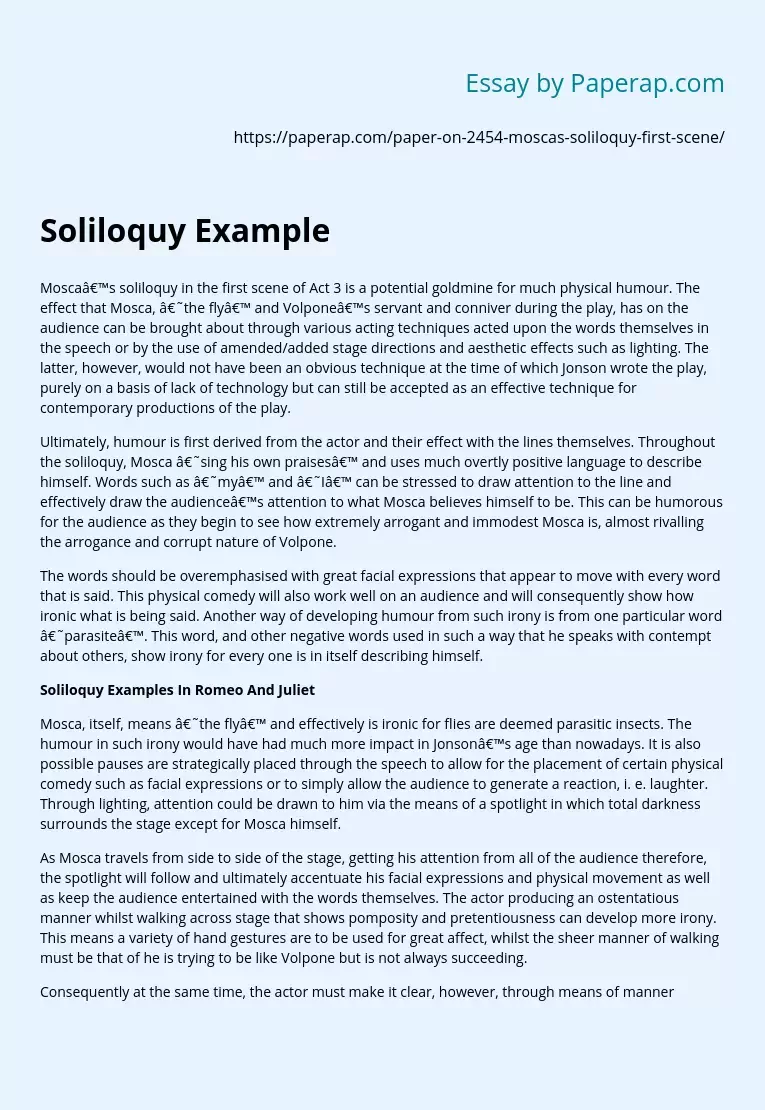Soliloquy Example
Mosca’s soliloquy in the first scene of Act 3 is a potential goldmine for much physical humour. The effect that Mosca, ‘the fly’ and Volpone’s servant and conniver during the play, has on the audience can be brought about through various acting techniques acted upon the words themselves in the speech or by the use of amended/added stage directions and aesthetic effects such as lighting. The latter, however, would not have been an obvious technique at the time of which Jonson wrote the play, purely on a basis of lack of technology but can still be accepted as an effective technique for contemporary productions of the play.
Ultimately, humour is first derived from the actor and their effect with the lines themselves. Throughout the soliloquy, Mosca ‘sing his own praises’ and uses much overtly positive language to describe himself. Words such as ‘my’ and ‘I’ can be stressed to draw attention to the line and effectively draw the audience’s attention to what Mosca believes himself to be.
This can be humorous for the audience as they begin to see how extremely arrogant and immodest Mosca is, almost rivalling the arrogance and corrupt nature of Volpone.
The words should be overemphasised with great facial expressions that appear to move with every word that is said. This physical comedy will also work well on an audience and will consequently show how ironic what is being said. Another way of developing humour from such irony is from one particular word ‘parasite’.
This word, and other negative words used in such a way that he speaks with contempt about others, show irony for every one is in itself describing himself.
Soliloquy Examples In Romeo And Juliet
Mosca, itself, means ‘the fly’ and effectively is ironic for flies are deemed parasitic insects. The humour in such irony would have had much more impact in Jonson’s age than nowadays. It is also possible pauses are strategically placed through the speech to allow for the placement of certain physical comedy such as facial expressions or to simply allow the audience to generate a reaction, i. e. laughter. Through lighting, attention could be drawn to him via the means of a spotlight in which total darkness surrounds the stage except for Mosca himself.
As Mosca travels from side to side of the stage, getting his attention from all of the audience therefore, the spotlight will follow and ultimately accentuate his facial expressions and physical movement as well as keep the audience entertained with the words themselves. The actor producing an ostentatious manner whilst walking across stage that shows pomposity and pretentiousness can develop more irony. This means a variety of hand gestures are to be used for great affect, whilst the sheer manner of walking must be that of he is trying to be like Volpone but is not always succeeding.
Consequently at the same time, the actor must make it clear, however, through means of manner (e. g. not always conforming to such a majestic approach) that Mosca is still a servant of Volpone and although he frequently challenges the slyness of his ‘master’, he has yet to match it. An important part to note is that although Mosca can continually be humorous through this soliloquy, an important message of Mosca’s true identity, rather than that we’ve seen already whilst Volpone is present is one of evilness to which extent will be unravelled later.
Soliloquy Example. (2019, Dec 05). Retrieved from https://paperap.com/paper-on-2454-moscas-soliloquy-first-scene/

